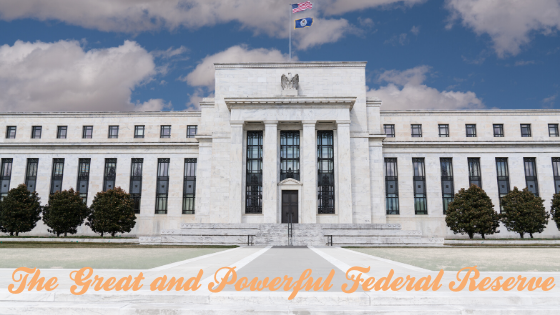April 7, 2020

I hope your week is off to a great start!
The last two communications I have sent focused on the CARES Act and what our government has been doing to combat fiscal issues surrounding the coronavirus. This week, let’s do a deeper dive into the Federal Reserve (the Fed) and what they are doing from a monetary standpoint. While the Fed and their actions can feel like the Great and Powerful Oz behind the curtain, they have helped provide liquidity to our economy and remove some of the uncertainty. The Federal Reserve was created by the Federal Reserve Act of 1913 to step in just as it is currently doing. I invite you go back and revisit our 2013 Annual Letter which describes how the Federal Reserve began. It’s quite the story.
This iteration of the Fed has taken the lessons learned of the past, many from the 2008 playbook, and used them extensively over the past few weeks plus introduce new actions. Chairman Jay Powell is not from academia or an economist like many of his predecessors. Powell has a degree in politics from Princeton and a law degree from Georgetown. He and his team have acted instinctually and, remarkably, before United States data made it clear that they needed to provide help to the economy. Though they were second guessed at the time, they have been, more than ever, aggressively proactive with decisive verbiage and deliberate operation. Future Federal Reserve Boards will learn from the ideas, tools and resources being used today just as the current Fed learned from the past.
During a crisis the Federal Reserve has even broader authority to conduct business, and they have promised to continue to use their current programs for as long as needed. Everything they are doing is too long to list in this email, but here are a few of the highlights:
- Lowered the fed funds rate to 0-.25%. The fed funds rate is a benchmark for interest charged on credit cards, mortgages and bank loans. By buying or selling bonds, they automatically raise or lower rates.
- Open-ended bond buying, now including mortgage backed securities, corporate and municipal bonds. This is done through their quantitative easing program where they electronically create money and buy securities. They will eventually sell securities down the road, removing money from the system, thereby causing interest rates to rise.
- Short-term loans to provide reserves and liquidity to money market funds.
- Main Street lending programs for small and midsize businesses.
- Funding a commercial paper program. Commercial paper securities are short-term in nature, typically less than 270 days in maturity, used by large businesses to fund their short-term operations.
You will notice on the list above that the Federal Reserve buying stocks is not listed. Currently, the ability to purchase stocks is not part of their mandate from Congress. In a recent interview with CNBC, former Fed Chair Janet Yellen said, “It would be a substantial change to give the Federal Reserve the ability to buy stock. I frankly don’t think it’s necessary at this point. I think intervention to support the credit markets is more important, but longer term it wouldn’t be a bad thing for Congress to reconsider the powers that the Fed has with respect to assets it can own.”
After 2008, the adage “Don’t fight the Fed” became a common mantra. Now, it seems like we are there again. Fed Chairman Powell recently commented in an interview on the Today Show, “When it comes to lending, we are not going to run out of ammunition. That doesn’t happen.” We do not need to fight the Fed this time around either. Have a great week! Take care, Tim
VIEW OUR Business Continuity Plan
CFP® Certified Financial Planner™ Certified Financial Planner Board of Standards, Inc. owns the certification marks above, which it awards to individuals who successfully complete initial and ongoing certification requirements.
Securities and advisory services offered through LPL Financial, a Registered Investment Advisor Member FINRA + SIPC.
The LPL Financial registered representative associated with this site may only discuss and/or transact securities business with residents of the Following states: NC, VA, SC, MD, DE and FL.
Financial planning services offered through LPL Financial, a registered investment advisor